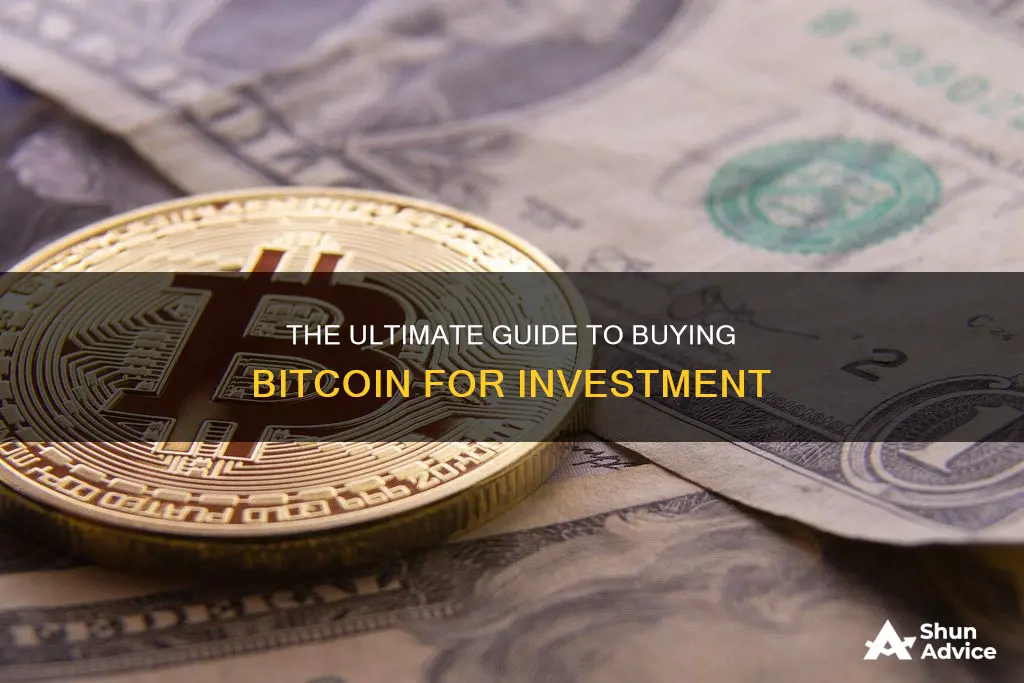
Bitcoin is a well-known cryptocurrency that has sparked the interest of many investors. If you're thinking of investing in Bitcoin, there are a few things you should know.
First, you'll need to choose a cryptocurrency exchange or brokerage account to buy and store your Bitcoin. Popular options include Coinbase, Robinhood, eToro, FTX, Gemini, and BlockFi. When choosing an exchange, take note of the fees and the reputation of the platform.
Next, you'll need to open an account and fund it with fiat currency, typically through an online transfer from your bank account. Some exchanges may also allow you to use payment apps like PayPal.
Once your account is funded, you can place a purchase order for Bitcoin. The exchange will convert your fiat currency into Bitcoin, which will be stored in your cryptocurrency account, similar to how stocks are held in a brokerage account.
It's important to understand the risks associated with investing in Bitcoin. The value of Bitcoin is highly volatile, and it could potentially drop to zero. Additionally, Bitcoin is susceptible to hacking and government actions, such as restrictions or bans.
To store your Bitcoin, you can choose between a hot wallet, which is provided by the exchange, or a cold wallet, which is an offline hardware device. Cold wallets are considered more secure but may require technical knowledge to set up.
Remember to do your own research, understand the risks, and only invest what you can afford to lose.
| Characteristics | Values |
|---|---|
| How to buy Bitcoin | Through a brokerage account or cryptocurrency exchange account |
| Through a major cryptocurrency exchange or brokerage, e.g. Coinbase, Gemini, Kraken, Binance, Robinhood, SoFi, Cash App | |
| Through a traditional broker, e.g. Webull, TradeStation, Fidelity | |
| Through a money transfer app, e.g. PayPal, Venmo, Cash App | |
| Through a Bitcoin ATM | |
| Through a Bitcoin exchange-traded fund | |
| Through a peer-to-peer money transfer app, e.g. MoonPay | |
| How to store Bitcoin | In a hot wallet or a cold wallet |
| A hot wallet is cloud-based and accessed through an app or computer browser | |
| A cold wallet is a small, encrypted portable device | |
| Risks of investing in Bitcoin | Bitcoin is a relatively new and risky asset |
| The price is highly volatile | |
| Bitcoin is susceptible to government actions and hacking | |
| Only invest what you can afford to lose |
What You'll Learn

Choosing a crypto-trading service or venue
There are dozens of crypto-trading services or venues to choose from. Here are some of the most popular ones:
- Coinbase is one of the largest exchanges, with over 100 million users. It offers a free wallet for its users and is based in the USA. However, fees can be high, and Coinbase may track how and where you spend your bitcoins.
- EToro is a trusted exchange with 25+ million users. It offers a free wallet and is easy and quick to use for purchases.
- Kraken is one of the USA's largest exchanges. It has very low fees and is highly rated for security and data protection. However, it requires ID verification, so it is not private.
- Gemini is one of the largest and most popular crypto exchanges in the USA. It is trustworthy and regulated, and offers instant deposits. However, it can be confusing to use for new buyers.
- Robinhood was the first mainstream investment broker to offer Bitcoin. It charges no fees for Bitcoin trades.
- Webull, TradeStation and Fidelity are other online brokers that offer access to Bitcoin or other cryptocurrencies.
- PayPal allowed users to buy and sell bitcoins starting in 2020. It can be a fast way to purchase coins if you are already verified.
- Bitcoin ATMs can be a quick and easy way to buy bitcoins and they're also private. However, they often have fees of 5-10%.
When choosing a crypto-trading service or venue, it is important to consider factors such as fees, security, privacy, ease of use, and whether it is regulated. It is also worth checking whether the service or venue supports the payment methods and cryptocurrencies that you want to use.
Study Crypto Index: Key Steps Before Investing
You may want to see also

Connecting your exchange to a payment option
Depending on the exchange, you may be required to provide personal identification, which may include a picture of your driver's license or Social Security card, as well as information about your employer and source of funds. The process is largely the same as setting up a typical brokerage account.
At most exchanges, you can connect your bank account directly or link it to a debit or credit card. Although you can use a credit card to purchase cryptocurrency, cryptocurrency price volatility could inflate the overall cost of purchasing a token when combined with a credit card's interest charges. Bitcoin is legal in the U.S., but some banks may question or even stop deposits to crypto-related sites or exchanges.
Fees vary for deposits via a bank account, debit, or credit card, and exchanges also charge fees per transaction.
It's important to note that while you can use a credit card to purchase Bitcoin, it's best to avoid taking on high-interest debt to invest in a risky asset. If the value of Bitcoin sinks, you could get stuck with big losses.
Some popular exchanges in the U.S. that allow you to connect your bank account or card include Coinbase, Kraken, Gemini, and Binance.
Altcoin Investing Guide for Indians: Getting Started
You may want to see also

Placing an order
Once you've chosen a crypto-trading service or venue, connected your exchange to a payment option, and funded your account, you can place an order for Bitcoin. Cryptocurrency exchanges have evolved to mimic stock brokerage services, offering several order types and ways to invest. Almost all crypto exchanges offer both market and limit orders, and some also provide stop-loss orders.
Kraken offers the most order types, including market, limit, stop-loss, stop-limit, take-profit, and take-profit limit orders. Exchanges also offer ways to set up recurring investments, allowing clients to dollar-cost average into their investments of choice. For example, Coinbase lets users set recurring purchases for every day, week, or month.
When you think the moment is right, click the buy button to enter an order. The exchange will turn your dollars into Bitcoin, stored in the same cryptocurrency account, similar to holding stocks in a brokerage account. Once your trade executes, you are officially a Bitcoin owner.
To purchase Bitcoin, enter the amount of Bitcoin (BTC) in your exchange's trading tool. You will need enough of your local currency for the transaction to go through once you click the button to submit.
Bitcoin transactions occur instantly on some exchanges, while others may process a transaction on the Bitcoin blockchain, which takes about 40 minutes to complete. However, you can choose to pay higher transaction fees for faster processing times with some exchanges.
The Ultimate Guide to Investing in Litecoin Cash
You may want to see also

Safe storage
- Hot Wallets vs. Cold Wallets: Hot wallets are online wallets, including apps on devices like computers, phones, or tablets. They are convenient for small amounts of cryptocurrency or active trading. However, they are more susceptible to theft or hacking attempts. Cold wallets, on the other hand, are offline wallets, such as hardware wallets or paper wallets, that are not connected to the internet. Cold wallets are considered more secure but may require technical knowledge to set up.
- Use of Hardware Wallets: Hardware wallets, such as TREZOR, are designed to store your Bitcoins in a hardened device resistant to viruses, hackers, and keyloggers. They offer a simple and highly secure way to store your Bitcoins.
- Cold Storage Wallets: Cold storage wallets, like those created using BitKey, generate and store private wallet keys on a clean, air-gapped computer. This method protects your Bitcoins from online threats but is still vulnerable to offline threats like hardware keyloggers or physical theft.
- Secure Offline Computers: You can set up a secure offline computer by using an old laptop or phone from a reputable manufacturer. Wipe the device, do not connect it to the internet, and install only an operating system and a Bitcoin wallet from a USB drive. This helps protect your Bitcoins from online threats.
- Private Key Security: Never share your private key with anyone. Keep it secret and secure. Private keys allow you to authorise transactions and are essential for the security of your Bitcoin holdings.
- Backup and Redundancy: It is crucial to back up your encrypted wallet data and store it in multiple secure locations. This includes saving it on cloud drives, USB drives, and CDs, as well as sending it to trusted individuals for safekeeping.
- Paper Wallets: Paper wallets involve printing or writing down your private keys and seed phrases on paper. While this method offers offline storage, it is susceptible to physical damage, theft, or loss. Consider laminating the paper or storing it in a safe deposit box or a fireproof safe.
- Multi-Signature and Cold Storage: Combining multi-signature and cold storage techniques can enhance security. Multi-signature wallets require multiple authorisations for transactions, reducing the risk of a single point of failure.
- Use of Passphrases: Create strong, unique passphrases for your wallets and accounts. Diceware is a good method for generating random and secure passphrases. Avoid reusing passphrases and never store them online.
- Two-Factor Authentication: Enable two-factor authentication whenever possible. This adds an extra layer of security to your accounts and helps protect your Bitcoin holdings.
MrBeast's Bitcoin Adventure: Did He Invest?
You may want to see also

Understanding the risks
Bitcoin is a relatively new and risky asset. Its value is highly volatile, and it could drop to zero. For example, the currency lost about half of its value over about three months in the first half of 2021.
Bitcoin is susceptible to government actions and could be made illegal or severely restricted, as happened in China. It is also susceptible to certain forms of hacking. If someone gets hold of your Bitcoin wallet address and password (private key), they can take your Bitcoin, and you likely won't be able to recoup your losses.
If you keep your Bitcoin in an online or "hot" wallet, you run the risk of losing funds to theft. Hot wallets that haven't implemented strong passwords, two-factor authentication, and safe internet browsing are particularly vulnerable.
Even if you use a secure, offline or "cold" wallet, it's essential to keep your access information secure and available. Losing your wallet information could lock you out of your currency.
As with any investment, it's important to only invest what you can afford to lose.
JPMorgan's Bitcoin Investment: Exploring the Giant's Crypto Move
You may want to see also
Frequently asked questions
The easiest way to buy Bitcoin is through a brokerage account or cryptocurrency exchange account. Popular places to buy Bitcoin include Coinbase, Robinhood, eToro, FTX, Gemini, and BlockFi, among many others.
You will need to provide some information, including your Social Security number and the number of your bank account, debit card or credit card to fund your Bitcoin account. Some providers may also require a picture ID.
While the value of a single bitcoin may be in the tens of thousands of dollars, you don’t need nearly that much money to invest in Bitcoin. At Coinbase, for example, you can buy as little as $2 of Bitcoin at a time.
Bitcoin is a relatively new and risky asset. While it’s possible that Bitcoin could double, triple, or even 10x in value over a short period of time, it could also drop to zero. Bitcoin is also susceptible to government actions and hacking.







